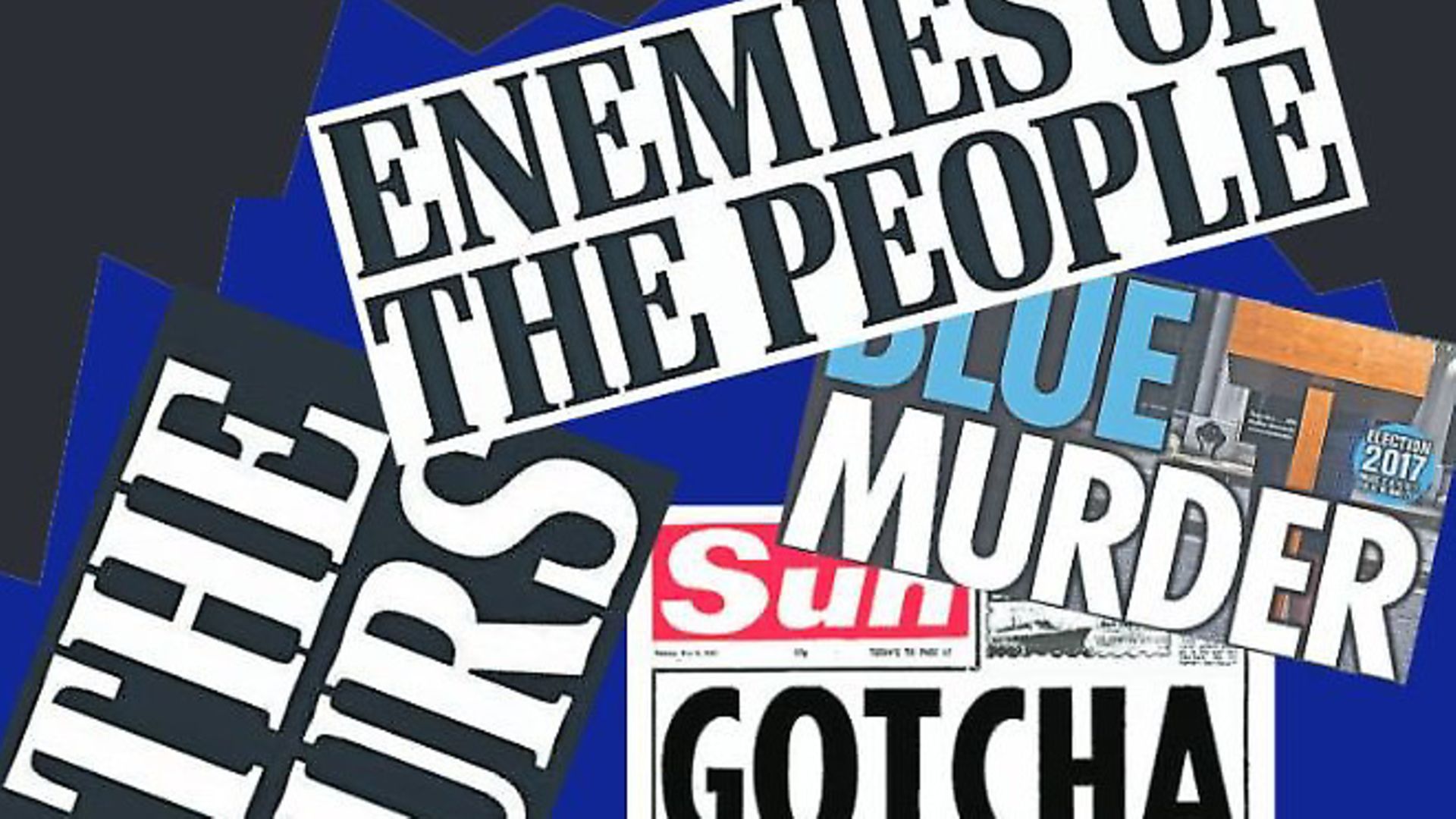
The truth behind the headlines and the claims that Britain’s Press is rabid and running wild
‘Hypocrite … the most dangerous women in Britain … shambolic … rambling …’ the insults levelled at our party leaders are brutal.
And on the political sidelines it doesn’t ease up – we have Sir Shifty, Lord Sleaze, Sir Cover-Up, Lord Fraud, Sir Spin, Baroness Bra and Mrs U-Turn, not forgetting ‘outsiders’ who dare dip a toe in the political quagmire: ever-smug tax avoiders, the self-righteous and, of course, the saboteurs.
A robust Press is a sign, they say, of a robust democracy. But does it have to be so cruel?
Some newspapers’ coverage of immigration has become so heated that a number of organisations – including the UN, the European Commission against Racism and Intolerance, and the Equality and Human Rights Commission – have asked them to quieten down.
Lobby groups, such as Stop Funding Hate, have even urged advertisers to pull away from such papers.
But nothing deters our best-selling papers. Indeed, such challenges seem to goad them into an even greater frenzy of righteous pontification on the freedom of the Press – as though the freedom to say what you like trumps the freedom to live in safety.
Has it always been that way? Are we of the snowflake tendency so scared of free speech, so easily offended that we can’t cope with the sort of rambunctiousness that has been the hallmark of the popular prints for centuries?
Or has it got uglier? Has the Press fostered the angry tone of the public conversation – exemplified by the Brexit debate – or does it merely reflect it?
And does such aggression help or harm democracy? Look at the treatment of Ed Miliband before the last election: it’s a fair bet that we remember less about his policies than about a bacon sandwich, two kitchens and a father who ‘hated Britain’. Even the papers seem to have forgotten the policies, since one was a cap on energy prices: an idea ridiculed at the time but celebrated now that it (or a version of it) has found its way on to May’s agenda.
After two years of Corbyn-bashing, we can expect more of the same during the current election campaign, but there are other targets too: the Daily Mail and The Sun campaigned for Cameron and Osborne in 2015. They are now the villainous toffs. The both backed John Major. He is now an interfering grey old man. The Sun even supported Tony Blair – and we know what the Press thinks of him now.
Nor is this approach confined to the two best-sellers. Almost every paper slants its coverage – the Telegraph has had a series of negative Corbyn headlines, while The Daily Mirror has dusted off its chicken costume to mock May for declining to appear in a televised debate.
Earlier this year, SubScribe conducted an online survey asking ‘Have our newspapers got nastier?’ It was thoroughly unscientific, in the same way that the Daily Express’s daily polls asking ‘Should Britain get out of Europe NOW?’ are.
The respondents were self-selected and predisposed to follow the line of the question. So the 98% ‘Yes’ was pretty well a given, and pretty irrelevant. What was interesting was the number of responses – more than 500 – and people’s enthusiasm in grasping an opportunity to say what they think about the Press.
Common themes were despondency at what were seen as attacks on foreigners, Muslims, women, the LGBT community, the NHS and the BBC. The NHS was mentioned surprisingly frequently. Hundreds returned to the old complaint that lies could be printed in giant type on page one and corrections in tiny type on page 93. In fact, most newspapers have a set position for corrections and clarifications that is always there even when there is nothing to correct.
The Independent Press Standards Organisation recognises this and generally requires papers to put their corrections in that slot. On rare occasions, papers are ordered to acknowledge their shortcomings on the front and to run a full adjudication on a specific page inside (perhaps not so rare, with the Daily Express being required to do this twice in a week in relation to misleading Brexit stories).
Respondents came from all walks of life – soldiers, teachers, health workers, businessmen, civil servants, shop workers – and included people from their early 20s to their late 70s. Dozens of journalists took part and all were disappointed at what was becoming of their trade. But again, it should be emphasised that the survey was self-selecting and so those who think all is hunky dory were unlikely to bother.
Those who did noted an erosion of the boundary between news and comment.
Ipso legitimises this to an extent by accepting that splash headlines can be statements of opinion.
Asked to identify when papers started getting nastier (if, indeed, they had), 80% of respondents said the last five or 10 years, and cited the decline in sales and the rise in social media. The Daily Mail scored a 100% hit rate in answer to the question ‘Do you think any of these papers are too nasty?’
‘Anger sells’ was a constant refrain. Well good news has never sold – as The New Day found to its cost last year – unless it’s the sort of good news that unites the country, such as a royal wedding or beating Germany at football.
As one former Sun executive said: ‘Papers, tabloids mainly, have always been capable of nastiness – because being nasty sells while being nice doesn’t. But the big difference is the absence of wit. Kelvin MacKenzie was brutal plenty of times, but there was usually a laugh tucked up somewhere. Today I just see nastiness and a race to the bottom.
‘I can see a clear moment when nastiness became the order of the day. Around 2003-5, The Sun was casting around for a replacement for Richard Littlejohn, who had gone back to the Mail. The paper hired a columnist whose aim was to be as rude as possible to as many people as possible. But there was no wit and the page became a relentless barrage of bar-room prejudices. The Mirror went down the same road. The aim was to have columnists so rude and jaw-droppingly offensive that a paragraph from them trailed on page one would pull in readers. It didn’t work. Readers were turned off. But it was the road that led inexorably to Katie Hopkins calling migrants cockroaches, which – after 40 years in Fleet Street – remains the most irresponsible and inflammatory thing I can recall seeing in print.’
MacKenzie the columnist, rather than editor, was certainly brutal in his treatment of Ross Barkley earlier this month – and it was hard to find the laugh tucked away in his characterisation of Liverpool.
Does his suspension show where the line has to be drawn? Hardly: he has written far worse and got away with it – notably accusing a newsreader of being deliberately provocative for wearing a hijab. His punishment probably had more to do with the Sky takeover bid than any feeling of contrition on the part of News UK.
Another former Sun journalist agreed that there had been a change for the worse, but dated it further back. She said: ‘Yes, The Sun got into trouble and the Mail was smug, but there was usually some element of tongue-in-cheek humour to lighten things. I think everything got nastier with Thatcher and never recovered.
‘Once upon a time the front-page splash was at least a semblance of news, now quite often it is comment and the headlines spell out the paper’s precis
of the comment to follow. Many of my former journalist friends are unable to stomach reading today’s papers and have chucked out their televisions.’
Julian Petley, professor of journalism at Brunel University, also identifies the Thatcher era as a key moment: ‘The Tory Press has always been pretty vile towards its ideological enemies, but a new ferocity came in as it hitched itself to Thatcher’s crusade to destroy socialism. Now the Tories and the client Press lurch ever further to the Right, the target is liberalism.
‘The British Press has always made a specialism of manufacturing folk devils in order to terrify its readers into accepting the need for the smack of firm government, but when judges and civil servants join the ranks of the demonised, it really is time to start worrying.’
Listing The Sun, Mail, Express and Telegraph as being ‘too nasty’, he continued: ‘Most of these papers’ stock in trade is setting what they take to be the majority at the throats of minorities. Hence endless stories, many completely untrue, about immigrants, scroungers, Muslims and so on. This isn’t journalism at all, but rather a virulent poison coursing through the veins of our society.’
Other observers agreed that the 80s were a black period and pointed to The Sun’s Hillsborough coverage and the ‘Gotcha!’ headline after the sinking of the Belgrano. But some believed that was the low point and that today’s papers are better behaved.
Roy Greenslade, a former Daily Mirror editor who is now a journalism professor at City University, was an assistant editor at The Sun in the early 80s. He takes a different view from our other Sun executives of the MacKenzie era: ‘The 80s were a wild-west period when both politicians and celebrities were treated very roughly: people climbing ladders to see into Russell Harty’s hospital ward as he lay dying; the treatment of Kinnock, Benn and Foot on a daily basis, with phony psychiatrists putting them ‘on the couch’, stories about ‘loony left’ councils and Eastern Europeans eating swans that were all myths.
‘Then there was the Kinnock lightbulb and Graham Taylor as a turnip. Everyone in the sports department hated that, but it was forced on them by Kelvin. And, of course there was the hounding of a certain Princess – although that was less clear-cut because she colluded in so much of what was written. But since MacKenzie moved on there has been a softer tone at The Sun.
‘The Sun and the Mail are the papers that count and they are the constructions of two men: MacKenzie and Paul Dacre. The Sun is not misbehaving as much as it used to, and I can’t imagine that anyone in the future will be as nasty as Dacre when he finally retires.’
At 68, Dacre shows no sign of retiring – any more than Rupert Murdoch seems ready to take a back seat at 86. Both seem to be relishing the May-Trump era. Murdoch was on hand to listen to Michael Gove interview Trump and Greenslade notes that Dacre has ‘finally found in May a prime minister he can admire’.
Indeed. The paper has been fawning over her and can be relied upon to champion her in its own inimitable way: by trashing – or ignoring – her opponents.
For the moment, such is the confidence in a Conservative victory that both the Mail and Sun have felt able to criticise her policies on tax, pensions, migration targets and foreign aid. But there are six weeks to go and if that opinion poll gap starts to shrink, you can bet that the attack dogs will be set loose on the ‘saboteurs’ while their handlers scream blue murder.
• Liz Gerard worked on national newspapers for 40 years. She now blogs on Fleet Street at www.sub-scribe.co.uk










